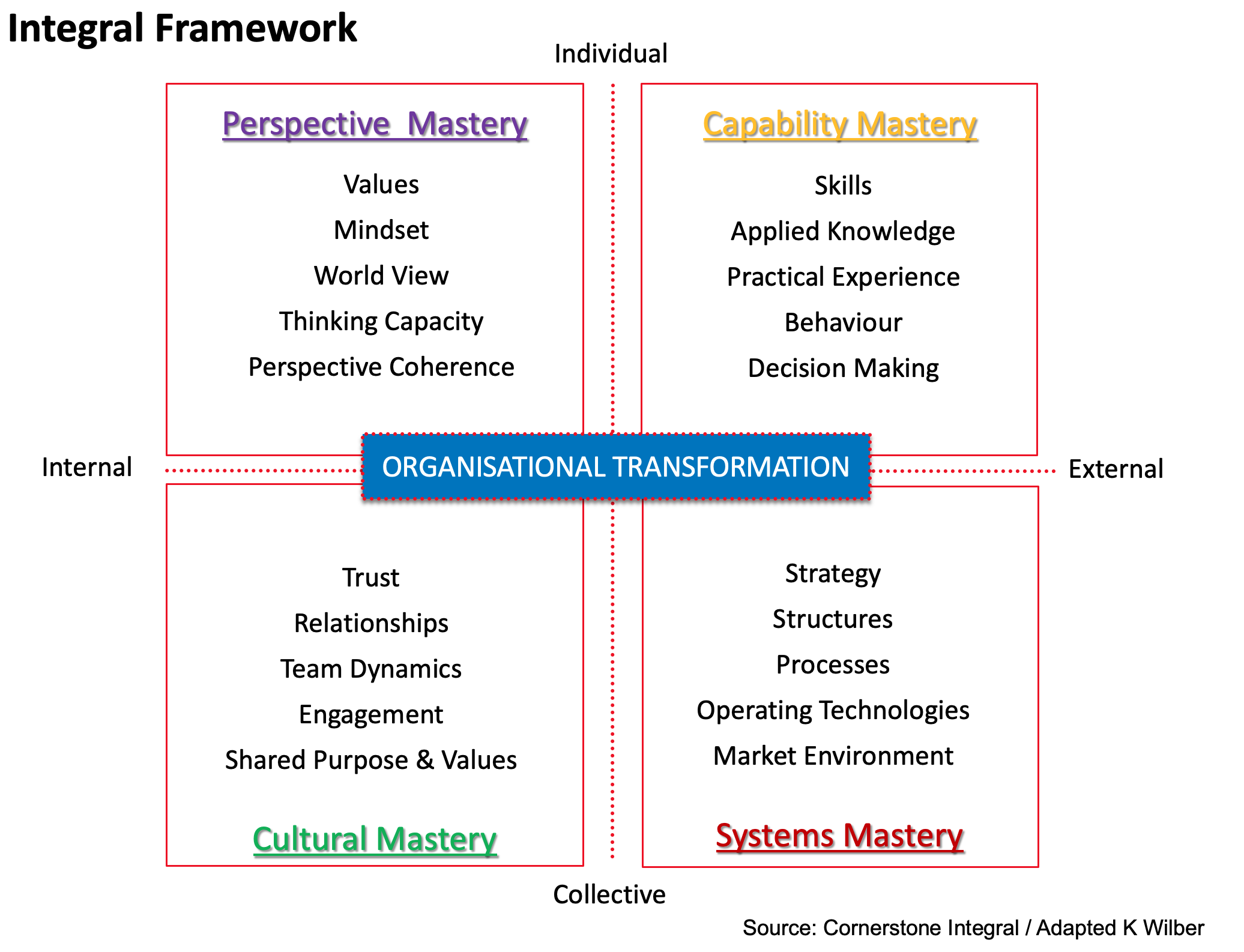You may well have heard of the acronym VUCA this is being used to describe current organisational life - Volatile, Uncertain, Complex and Ambiguous.
The most effective way we know of to make sense of a VUCA world and the organisations in it, is through the lens of the Integral Framework and Cornerstone’s approach to transformation – what we call Ascension – in part, is an adaption of The Integral Framework and our interpretation of it.
The Integral Framework originates in the work of Ken Wilber, an American philosopher, educator and commentator whose work has been widely published in many languages. The core of Integral philosophy is simple (but not easy): every aspect of human knowledge, ever discovered, has some important piece of truth.
Many things are true, but only partially so, including the Integral Framework. Indeed, some aspects of human experience are radically ‘wrong’, but still have something to teach us. In other words, there must be a way to make sense of the grand total of all human knowledge and experience – from every culture, from every era, from every discipline.
This “big picture view” is why Integral philosophy is arguably one of the world’s most comprehensive ways of thinking about human evolution, knowledge, and the world around us. Scholars have applied it to over 60 different academic fields and domains of human knowledge.
Cornerstone has adapted Ken Wilber’s framework to organisational life and we use it as our primary sense-making tool. We go a bit further and also use the Framework as a diagnostic tool to help identify the pain points of an organisation. We then use Integral thinking to help us and our clients co-create appropriate remedies or interventions. The word ‘integral’ is significant because the framework brings together and integrates disparate theories and systems of thought into a single coherent understanding of organisational life. It is this coherence that helps our clients navigate increasingly VUCA conditions and landscapes.
The Integral Framework makes a simple yet profound observation: everything in organisational life can be looked at through one of four sense-making lenses which we have labelled as Perspective, Capability, Cultural and Systems.
These four perspectives come from two dimensions:
The horizontal axis – Internal / External
The vertical axis - Individual / Collective
From these two axes four quadrants result:
Perspective Mastery- the Upper Left Quadrant: the internal domain of the individual and all those things that go to make up who we are – our personal values, beliefs, mindsets, thinking capacity, just to label a few.
Capability Mastery- the Upper Right Quadrant: that which is external to the individual – what we can observe and see i.e., one’s skill, behaviour, experience, applied knowledge etc.
Cultural Mastery - the Lower Left Quadrant: the internal domain of the collective – the team, division, organisation which is the realm of shared purpose & values, relationships and trust.
Systems Mastery - the Lower Right Quadrant: that which is external to the collective – business strategy and KPIs, processes, systems, market dynamics
The Integral Framework has the power to encompass all the ideas, theories and models of the business and leadership development world and unite them in a meta framework. What this allows a leader and a business to do is to masterfully diagnose, select and apply the right model at the right time in the right place for the right reason to the right person and get the right result...think of it like acupuncture for your organisation.
The graphic below is just a tiny snapshot of the plethora of books, concepts, models and theories about organisations and leadership. How do you make sense of all this and how do you know which is the right approach for your organisation?
At Cornerstone we have captured the most comprehensive approaches to organisational transformation and incorporated these into a meta-approach that we call Integral Ascension.
Underpinning Ascension is the fundamental premise that in order for organisations to meet the challenges of the future we need to grow and transform in a way that develops:
Collaborative Capacity
Intellectual Humility
VUCA Navigation Skills
Collaborative Capacity
Collaborative Capacity is not a ‘nice to have’ it is a critical must. Our view of contemporary organisational life is that it is characterised by blurred or non-existent local-global boundaries, ever-expanding technologies, fast-paced competitiveness, an indefatigable drive for shareholder value (and the oft-associated cost cutting), relentless focus on performance along with mergers, acquisitions, restructures, takeovers and re- engineering. Put together, these elements have created an environment that is stunningly complex and turbulent. And it’s not going away; if anything, complexity, pace and turbulence are going to increase. What this means is that we cannot work alone in navigating this world.
We simply must collaborate with each other to make the best decisions in a complex environment. No one leader can possibly have all the answers. Not only do we not individually have the answers, we do not have the capacity to see the totality of what must be seen; we can’t see, let alone take in the plethora of data that exists and that must be taken into account if we are to make fully informed, cohesive decisions. It’s just too much.
Intellectual Humility
If you are with us so far and agree that collaboration is required to navigate complexity, then you must surely agree that to truly collaborate, which in part necessitates the ability to seek and coordinate others’ perspectives, then Intellectual Humility is also a must.
Carol Dweck defines Intellectual Humility as “acknowledging the partial nature of one’s understanding and valuing others’ intelligence’. Without it, we are disabled from learning. With it, we are in a state of openness to new ideas and we have a willingness to be receptive to new sources of evidence.
VUCA Navigation Skills
Perspective (Upper Left Quadrant) and Capability (Upper Right Quadrant) bounce back and forth between each other and are informed by each other. Intellectual Humility and the willingness to collaborative are critical Perspectives; actual collaboration and VUCA Skills are critical Capabilities. VUCA navigation skills are defined as: perspective coordination, contextual thinking, collaborative capacity and effective decision-making (Dr Theo Dawson, Lectica Inc.) Mastery in both Quadrants is required to shift Culture and Systems along the spectrum from toxic to vibrant and from obstructive to constructive respectively. What this looks like in our world is seen by the graphic below – the next overlay of the Integral Framework and what we call Ascension Architecture.
There’s a lot to explain and explore here. We are super keen to have a dialogue with you around the concepts we’ve shared and to hear your perspective. However, what we can say is that when your organisation is attempting to transform itself, (whether that transformation be a technical transformation, a digital transformation or a systems transformation) using the Integral Ascension process will increase the likelihood that your transformation will be successful and enduring.
Ascension will ensure that:
Your organisation will have a structure that is fit for purpose and able to meet the complexity of your market environment in an agile and adaptive way.
Your organisation understands that there is no such thing as a good or bad culture; rather that culture is a dynamic phenomenon and there are healthy and unhealthy expressions of each of the multiple dynamics. The challenge for every organisation is to identify the healthiest expression of each dynamic.
Each individual in your organisation will develop a more elevated and evolved perspective so that they are able to deal intellectually and emotionally with the ever increasing complexity of organisational life.
Finally, Ascension will ensure that each individual in your organisation will learn behavioural flexibility and agility that will allow them to deal with whatever situations they face when dealing with other organisational members, customers and stakeholders.
So we are making an offer to you to connect with us and offer your perspective. This includes a complimentary 2 hour whiteboard session (either virtual or face to face) with a couple of our directors where we’ll use the Integral Framework and the Ascension Approach to make a first pass evaluation of your organisation/division/function/team.




